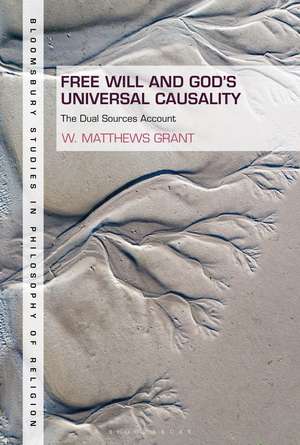Free Will and God's Universal Causality: The Dual Sources Account: Bloomsbury Studies in Philosophy of Religion
Autor Professor W. Matthews Granten Limba Engleză Paperback – 16 sep 2020
| Toate formatele și edițiile | Preț | Express |
|---|---|---|
| Paperback (1) | 224.66 lei 6-8 săpt. | |
| Bloomsbury Publishing – 16 sep 2020 | 224.66 lei 6-8 săpt. | |
| Hardback (1) | 656.90 lei 3-5 săpt. | |
| Bloomsbury Publishing – 15 mai 2019 | 656.90 lei 3-5 săpt. |
Din seria Bloomsbury Studies in Philosophy of Religion
- 30%
 Preț: 527.07 lei
Preț: 527.07 lei - 19%
 Preț: 191.38 lei
Preț: 191.38 lei - 13%
 Preț: 254.19 lei
Preț: 254.19 lei - 22%
 Preț: 232.90 lei
Preț: 232.90 lei - 12%
 Preț: 234.38 lei
Preț: 234.38 lei -
 Preț: 258.42 lei
Preț: 258.42 lei - 13%
 Preț: 255.84 lei
Preț: 255.84 lei - 13%
 Preț: 224.58 lei
Preț: 224.58 lei - 31%
 Preț: 830.20 lei
Preț: 830.20 lei - 22%
 Preț: 257.50 lei
Preț: 257.50 lei -
 Preț: 257.03 lei
Preț: 257.03 lei -
 Preț: 259.42 lei
Preț: 259.42 lei -
 Preț: 254.93 lei
Preț: 254.93 lei - 21%
 Preț: 216.52 lei
Preț: 216.52 lei - 23%
 Preț: 190.50 lei
Preț: 190.50 lei - 23%
 Preț: 192.30 lei
Preț: 192.30 lei - 23%
 Preț: 191.22 lei
Preț: 191.22 lei
Preț: 224.66 lei
Preț vechi: 288.82 lei
-22% Nou
Puncte Express: 337
Preț estimativ în valută:
42.99€ • 45.01$ • 35.66£
42.99€ • 45.01$ • 35.66£
Carte tipărită la comandă
Livrare economică 10-24 aprilie
Preluare comenzi: 021 569.72.76
Specificații
ISBN-13: 9781350203655
ISBN-10: 1350203653
Pagini: 256
Dimensiuni: 156 x 234 mm
Greutate: 0.37 kg
Editura: Bloomsbury Publishing
Colecția Bloomsbury Academic
Seria Bloomsbury Studies in Philosophy of Religion
Locul publicării:London, United Kingdom
ISBN-10: 1350203653
Pagini: 256
Dimensiuni: 156 x 234 mm
Greutate: 0.37 kg
Editura: Bloomsbury Publishing
Colecția Bloomsbury Academic
Seria Bloomsbury Studies in Philosophy of Religion
Locul publicării:London, United Kingdom
Caracteristici
Attempts to date to reconcile libertarian freedom with the traditional doctrine of God's universal causality.
Notă biografică
W. Matthews Grant is Professor of Philosophy at University of St Thomas (MN), USA.
Cuprins
Acknowledgments1. Introduction 1.1. Divine Universal Causality (DUC) and Creaturely Action 1.2. Libertarian Freedom and the Apparent Conflict with DUC 1.3. Dual Sources: A Neo-scholastic Approach to Resolving the Conflict 2. God: Universal Cause and Cause of Human Actions 2.1. Scripture 2.2. Perfect Being Theology: An Anselmian Approach 2.3. Cosmological Arguments from Contingency 2.4. Conservation and Concurrence: A Suarezian Argument 2.5. A Thomistic Argument from Participation 3. Divine Universal Causality and the Threat of Occasionalism 3.1. Does DUC render creaturely causes otiose? 3.2. God and Creaturely Causes: The Claims of Non-Occasionalist DUC 3.3. Non-Occasionalist DUC: The Metaphysical Objection 3.4. Non-Occasionalist DUC: The Epistemic Objection 3.5. Can agent-causal acts be caused by God? 4. Free Creatures of the Universal Cause 4.1. The Intrinsic/Extrinsic Distinction 4.2. Why DUC may appear to preclude libertarian freedom 4.3. The Extrinsic Model of Divine Agency 4.4. DUC without Determinism4.5. Ability to do otherwise 4.6. Ultimate Responsibility 4.7. Dual Sources 5. The Extrinsic Model Defended 5.1. The Extrinsic Model, Intrinsic Models, and Scholastic Theology 5.2. From DUC to the Extrinsic Model 5.3. But is the Extrinsic Model also ruled out by DUC? 5.4. Does the Extrinsic Model render Divine Causality Unintelligible? 6. Does God Cause Sin? 6.1. DUC, Moral Evil, and the Privation Solution 6.2. Moral Evil and Privation 6.3. Objections to the Privation Account of Moral Evil 6.4. Does God cause the badness in sinful acts simply by causing the acts? 6.5. How the badness in sinful acts is caused by the sinner alone 7. The Problem of Moral Evil 7.1. The Failure of the Free Will Defense 7.2. Responding to the problem without FWD 7.3. Moral Evil, Dual Sources, and Molinism 7.4. Moral Evil, Dual Sources, and Open Theism 7.5. Sin and the Divine Will 7.6. God's Involvement in Sin: A Cost of Dual Sources? 8. Providence, Grace, and Predestination 8.1. An Extrinsic Model of Divine Knowing 8.2. Time, Foreknowledge, and a Variation on the Eternity Solution 8.3. Providence 8.4. Grace 8.5. Divine-Human Dialogue 8.6. Predestination Notes Bibliography Index
Recenzii
Free Will and God's Universal Causality is a significant and novel contribution to the philosophical and theological literature on divine providence, in particular the interaction between human and divine agency. The book is clearly written, exceptionally argued, and truly innovative in many ways.
Unique, bold, and genuinely innovative.
This book makes the best case I have seen for a roughly Thomistic approach to reconciling divine universal causality with libertarian freedom. It is a significant contribution to contemporary philosophy of religion.
This is a careful, well-argued book. In addition to making a powerful case that a creaturely action can be caused by God and still free in the libertarian sense, it sheds new light on a host of debates concerning divine and human agency (including God's role in sin, the free will defense, and the nature of providence, grace, and predestination). Highly recommended.
Unique, bold, and genuinely innovative.
This book makes the best case I have seen for a roughly Thomistic approach to reconciling divine universal causality with libertarian freedom. It is a significant contribution to contemporary philosophy of religion.
This is a careful, well-argued book. In addition to making a powerful case that a creaturely action can be caused by God and still free in the libertarian sense, it sheds new light on a host of debates concerning divine and human agency (including God's role in sin, the free will defense, and the nature of providence, grace, and predestination). Highly recommended.
